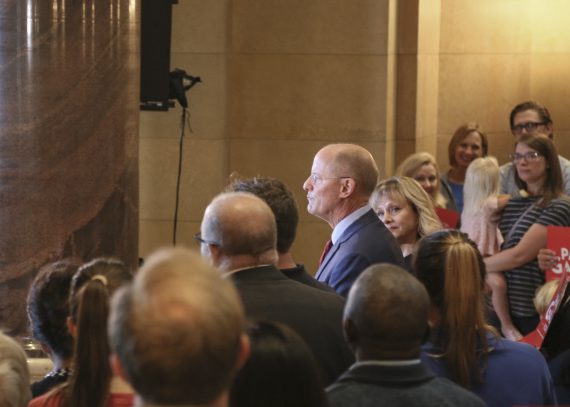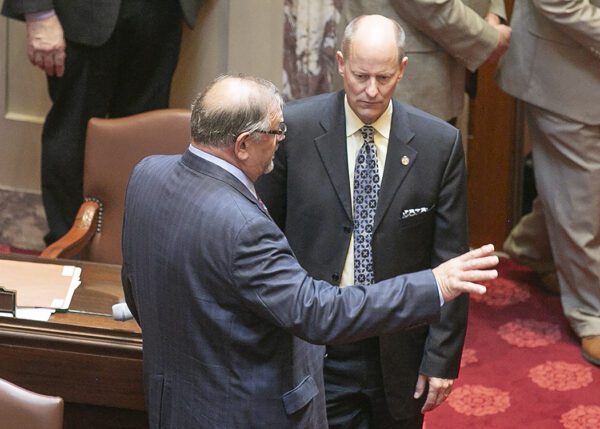Sen. Paul Gazelka announces for governor at a Capitol press conference Wednesday. (Photo: Kevin Featherly)
Exiting GOP Senate majority leader slams Walz’s ‘inexcusable absence of leadership’
Update: 7:23 a.m., Sept. 9: Overnight, the GOP Senate elected Senate President Jeremy Miller, R-Winona, to replace Sen. Paul Gazelka, R-East Gull Lake, as the Senate’s new majority leader.
Sen. Paul Gazelka made official what virtually no one failed to anticipate Wednesday, by entering the race for Minnesota governor.
“I know what makes Minnesota great,” he told a gathering of journalists and supporters inside the Minnesota Capitol. “It’s our people.”
The exiting Senate majority leader from East Gull Lake positioned himself as a collaborative conservative candidate who has worked with Democrats to keep government running, without raising taxes.
He pledged to make Minnesota a place where hard-working people can improve their lot, where police are respected and allowed to do their jobs and where a robust economy can lead to broad prosperity.
He also promised to build on his bona fides as a pro-life, pro-Second Amendment conservative who would return any budget surplus to the taxpayers while rebuilding reliable public infrastructure. And he said he would steer hard from the political course that Gov. Tim Walz has pursued.
“The vision just beginning requires hard work and discerning leadership to make it reality,” he said. “I am asking for the help of all of us to make this vision a reality.”
‘Irresponsible shutdown’
Gazelka, a persistent opponent of Walz’s emergency authority, said the state is at a crossroads. “Tim Walz’s irresponsible shutdown, based on his lack of understanding of the scientific data, closed hundreds of restaurants and small businesses across the state—bankrupting many of them,” he said.
“His inexcusable absence of leadership during the riots endangered countless families, businesses and communities,” Gazelka continued. “And his careless statements over National Guard, police and peace officers created unfair mistrust of them and put their lives at risk.”
Gazelka also accused the governor of failing a generation of schoolchildren by closing schools during the pandemic. He argued that health data now shows Walz’s policy choices were wrong and set kids so far behind in school that it will be hard to catch up. “But I’m saying we’re going to help them catch up,” he said.
He said he also will work to remake Minnesota as a place where citizens are “free to worship without interference from politicians like Tim Walz.” That was an apparent reference to pandemic-era executive orders limiting the number of people who could gather for in-person church services and funerals.
Main strength a weakness?
Gazelka has been known to take tough partisan, even hardline stances opposing Democrats on some issues.
He has blasted liberal leadership at the Capitol and the city of Minneapolis for what he saw as a disastrously failed public safety response after George Floyd’s death. He has rejected many elements of the DFL’s police reform agenda and has repeatedly tangled with Walz on pandemic emergency powers.
He also has maneuvered to oust several of Walz’s agency commissioners by denying them confirmation, though one actually resigned first. Some Senate Democrats called those Gazelka-engineered ousters little more than revenge for the governor’s pandemic policies.
Yet Gazelka also has worked closely with House Speaker Melissa Hortman, DFL-Brooklyn Park, and the governor—sometimes to the chagrin of House Republicans—to reach budget deals, pass legislation and avoid government shutdowns.
Former state Sen. Jeff Hayden, DFL-Minneapolis, who now works government affairs for Fredrikson & Byron, said that Gazelka’s ability to compromise with Democrats was his greatest strength as Senate majority leader. But it might be his greatest weakness as a candidate, Hayden said.
“I think his opponents might use that against him,” Hayden told Session/Law last week. That’s because the pro-Trump bloc, which Gazelka calls “the passionate side of the Republican Party,” hasn’t always displayed a desire for good governance so much as a craving for political combat. Or, as illustrated by the violent insurrection at the U.S. Capitol on Jan. 6, for actual combat.
Hamline University’s David Schultz thinks Gazelka is well-positioned to compete as a GOP candidate, owning perhaps the greatest name recognition among Republican hopefuls. But Schultz agrees that Hayden might have a point about his internecine vulnerabilities.
“The Republican Party is really so anti-government at this point,” Schultz said. “The Democrats are to some extent, too. But the Republicans are so winner-take-all that [Gazelka] might be looked upon as somebody who has given in too much.”
Asked about that by Session/Law Wednesday, Gazelka said it is his responsibility to build the necessary bridges and win over a critical mass of Republican support.
“The base cares that we defend the Second Amendment and protect the preciousness of life,” he said. “In the end, I do think that people will see that I can govern and also that we can hold the line on the things that are important to Republicans.”

Sen. Paul Gazelka (center of frame) is flanked by supporters as he announces his candidacy for governor Wednesday. (Photo: Kevin Featherly)
‘He’s more moderate’
One of Gazelka’s opponents, former Sen. Scott Jensen, R-Chaska, got into the race much earlier. Jensen, a physician, has openly courted anti-vaxxers, appearing on FOX News at times to argue that states have inflated their COVID-19 death statistics to make the pandemic seem more calamitous than it is.
Though he was criticized after fellow Sen. Jerry Relph, R-St. Cloud, died from COVID-19 after attending an unmasked 2020 Republican gathering, Gazelka said Wednesday that he takes COVID-19 seriously, having once contracted the disease himself. Every adult should get vaccinated, Gazelka said, but inoculations should not be mandatory.
He said that, aside from Jensen’s stance on vaccinations, the Chaska doctor actually is less conservative than Gazelka on core GOP issues, including the Second Amendment and single-payer healthcare. (In fact, as a senator, Jensen once voted for a Greater Minnesota public health insurance option. The vote failed only because one DFL senator was out of town that day.)
“He’s more moderate than I am,” Gazelka said. “But people will have to decide who is the best candidate.”
Gazelka said he is determined to see Republicans win the House and Senate, as well as the governor’s race—a governing trifecta he has never seen during his lifetime. The key to achieving that, he said, is expanding his party’s voting coalition.
He says he has a head start toward that goal, building inroads with traditionally DFL Iron Range voters, through his support for the Enbridge pipeline and the PolyMet copper-nickel mine, which environmentalists and indigenous groups have vigorously opposed.
Meanwhile, he indicated, his pro-police stance is helping him build support in Twin Cities suburbs. “They don’t want to defund the police,” Gazelka said. “That’s a misconception of too many of the leaders in Minneapolis.”
However, he evaded questions from two reporters Wednesday on whether he would support a Texas-style near-ban on abortions—a position that could cost him support among suburban women. He said he would have to read a particular bill’s language before committing to supporting it.
“I am pro-life and my whole record shows that,” Gazelka said. His policies, he said, would “follow down that path.”
Schultz said it’s apparent that Gazelka’s strategy is to capitalize on his base’s anger toward Walz around police policy and masking mandates, while picking off suburban and Iron Range independents.
“He’s kind of hoping that he is, in many ways, the persona for the last year or so of taking on the governor—hoping that gives him an edge up compared up to everybody else,” Schultz said. “And I think it does.”

Sen. Tom Bakk, I-Cook, is shown with Sen. Paul Gazelka, R-East Gull Lake, on the Senate flooring 2019. (Photo: Kevin Featherly)
Counting on Bakk
Gazelka said some Iron Range DFL lawmakers are prepared to support and promote his bid for governor in their districts.
He wouldn’t immediately name them, but did drop the name of one recent DFL defector as a supporter: Sen. Tom Bakk, I-Cook, the Democrats’ one-time Senate majority leader who Gazelka said might run for re-election as a Republican.
Bakk, a long-time Iron Range DFL stalwart, was unseated as Senate minority leader by Sen. Susan Kent, DFL-Woodbury. He bolted the party months later and began caucusing with the Republicans. Last week, Kent announced that she would leave her leadership post immediately and retire from the Senate at the end of her current term.
Gazelka, who stepped down as Senate majority leader last week, said he is not publicly supporting any particular candidate to replace him. “I’ve helped to raise up and train a number of good, qualified leaders,” he said.
He said a new majority leader likely will be chosen sometime this week.
Then there were six…
Gazelka’s entry to the governor’s race means there are now six GOP candidates for the job. Two of his GOP opponents, Jensen and Sen. Michelle Benson, R-Ham Lake—the Senate’s Health and Human Services Finance and Policy Committee chair—have worked beside Gazelka in the Senate. Others in the race include Lexington Mayor Mike Murphy, businessman Mike Marti and dermatologist Neil Shah.
Gazelka said he would respect his party’s endorsement and won’t run in a primary if he fails to secure it.
Gov. Tim Walz is expected to compete for a second term in 2022, but he has yet to announce his candidacy.


